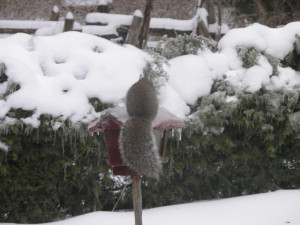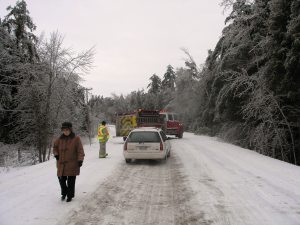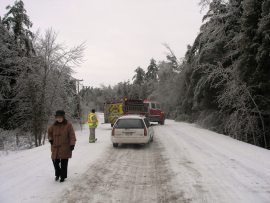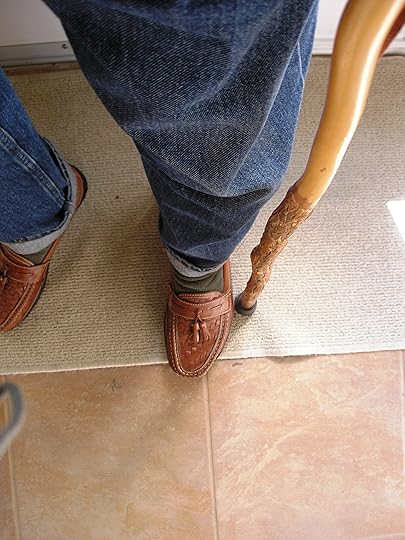Eric E. Wright's Blog, page 38
February 6, 2014
Pesky Squirrels Model Persistence
 Our black squirrel took a flying leap from the deck banister and grabbed onto the cage of suet hanging from the roof. What an acrobat! It clung to the cage while it tried everything to get at the suet inside. Finally, it concentrated on the wire tie I had used to keep it closed. It kept gnawing and twisting until finally it broke it off, opened the cage and settled down for a royal feast.
Our black squirrel took a flying leap from the deck banister and grabbed onto the cage of suet hanging from the roof. What an acrobat! It clung to the cage while it tried everything to get at the suet inside. Finally, it concentrated on the wire tie I had used to keep it closed. It kept gnawing and twisting until finally it broke it off, opened the cage and settled down for a royal feast.
Mary Helen said, “Poor thing. It’s hungry. Let it be.”
True, it’s been a cold, snowy winter that makes it very hard on our furry friends: black, brown and grey squirrels. And they do provide us with almost daily entertainment. The other day I watched one climbing the pole holding our bird feeder until it got to the circular  squirrel baffle. It tried dozens to times to climb over the baffle only to be frustrated by its loose motion. Then it would climb down, survey the situation and try again. When we had an ice-storm, the ice froze the ‘squirrel baffle’ to the post keeping it from moving. Until it thawed, our persistent squirrels were able to swing themselve over and empty the feeder.
squirrel baffle. It tried dozens to times to climb over the baffle only to be frustrated by its loose motion. Then it would climb down, survey the situation and try again. When we had an ice-storm, the ice froze the ‘squirrel baffle’ to the post keeping it from moving. Until it thawed, our persistent squirrels were able to swing themselve over and empty the feeder.
The ingenuity and persistence of our squirrels is amazing. Until I used duct tape to hold the finch feeder to its bracket, they kept knocking it down. Do squirrels eat niger bird seed? I’ve had to put stronger and stronger wire on the suet cage to defeat them so the woodpeckers have something to eat.
 We could learn a lot from our furry friends. Never, never give up. If we accept the difficulties in our lives as a challenge, like the squirrels, we will develop perseverance. Paul and James explain. “We also rejoice in our sufferings, because we know that suffering produces perseverance; perseverance, character, and character hope”(Rom.5:4). “The testing of your faith develops perseverance”(James 1:3). Becoming a persevering person is a crucial quality of maturity and character.
We could learn a lot from our furry friends. Never, never give up. If we accept the difficulties in our lives as a challenge, like the squirrels, we will develop perseverance. Paul and James explain. “We also rejoice in our sufferings, because we know that suffering produces perseverance; perseverance, character, and character hope”(Rom.5:4). “The testing of your faith develops perseverance”(James 1:3). Becoming a persevering person is a crucial quality of maturity and character.
As Nelson Mandela said; “The greatest glory in living lies not in never failing, but in rising every time we fail.” Harriet Beecher Stowe wrote; “When you get into a tight place and everything goes against you till it seems as though you could not hold on a minute longer, never give up then, for that is just the place and time that the tide will turn.”
Calvin Coolidge is even more insistent on the importance of persistence. “Nothing in the world can take the place of persistence. Talent will not… nothing  is more common than unsuccessful people with talent. Genius will not… unrewarded genius is almost legendary. Education will not…. the world is full of educated derelicts. Persistence and determination alone are omnipotent.”
is more common than unsuccessful people with talent. Genius will not… unrewarded genius is almost legendary. Education will not…. the world is full of educated derelicts. Persistence and determination alone are omnipotent.”
Lord, give us grace to persevere whatever the obstacle.


February 3, 2014
The Book That Made Your World
 The Book that Made Your World: How the Bible Created the Soul of Western Civilization by Vishal Mangalwadi
The Book that Made Your World: How the Bible Created the Soul of Western Civilization by Vishal Mangalwadi
My rating: 5 of 5 stars
Out of his own Indian experience of Hinduism, Buddhism, and Islam along with his scholarly research and study of western secular humanism Mangalwadi demonstrates the historical effect the Bible has had on our world. This books should drop like a bomb in the middle of our complacent and arrogant so-called secular scholars. That it won’t is due more to their prejudice than reality. That it has been written by a non-western Asian is startling in itself.
Mangalwadi seeds his scholarship throughout by telling illustrations from his experiences in both India and the West. With voluminous quotations from an astounding array of scholars of every stripe, he establishes the democratizing, liberating, inspiring role of the Bible in the success of Western civilization and its spread throughout the world.
He traces the effect biblical knowledge has had on human’s rediscovering their humanity, becoming thinking, rational people who were given to invent things–the rise of technology. He shows the effect it has had on freeing women, marriage, banning slavery, etc.
He ponders how the abosolutely unique character of Christ,an apparently defeated hero, supercedes the mythiccall heros of the ancient world to remake civilization in miniscule amounts into his own image. Christians, believers in the dignity of man and in morality, became the revolutionaries that really changed individual societies and ultimately vast segments of the world.
He shows how the Bible inspired language codification, translation and great literature; how it led to the founding of universities and was the inspiration for genuine science.
He establishes the role it played in rooting morality at the foundations of just societies, without which corruption becomes epidemic. Which societies are the least corrupt? Those founded on Protestant principles.
He traces the effect Bible believers have had on exalting the family; inspiring compassion through a host of insitutions including hospitals, leprosariums, and orphanages; creating wealth and innovation.
Perhaps, most important, he shows the effect it has had on producing human liberty. He gives case studies along the way to demonstrate the transforming effect the Bible has had even on societies as disturbed as those who were headhunters.
This is not a book to read in a week or even month, at least in my mind. It is a book to read in small batches that inspire thought. Every thinking person, especially secular humanists and post-modernists who are leading us deeper and deeper into despair, need to read this book. Highly recommended.


January 24, 2014
No Place Like Home
We crept ahead an inch at a time through driving snow. I peered ahead past our line of cars but spotted no reason for our delay beyond the slick nature of the snowy road surface. My knuckles gripped the steering wheel as if the intensity of their grasp could ensure safety. A fire-truck sped by us o n the right shoulder; a tow-truck on the left. I massaged my right knee to keep it from cramping from the tension. Ten minutes. Fifteen. Thirty. What if?
n the right shoulder; a tow-truck on the left. I massaged my right knee to keep it from cramping from the tension. Ten minutes. Fifteen. Thirty. What if?
Then two badly damaged cars materialized, one against the left guardrail, the other nose toward the ditch on the right. We crept by only to pass three—no five—no six or seven more each showing the effects of crashes. Fortunately, they were receiving help although no police had yet appeared to shut down the road.
With a sigh of relief we exited the highway and soon turned into our own driveway. Home! Warmth. Shelter. Is there anything like it on a cold, snowy day? We turned up the thermostat, put on coffee, and relaxed.
I could feel the tension g radually dissipate as I sat there drinking my coffee on our couch. I looked around: the familiar pictures on the wall, the china cabinet, the dining room table, the rug, the kitchen counter. I smiled at Mary Helen across the room in her recliner. “I am blessed,” I thought.
radually dissipate as I sat there drinking my coffee on our couch. I looked around: the familiar pictures on the wall, the china cabinet, the dining room table, the rug, the kitchen counter. I smiled at Mary Helen across the room in her recliner. “I am blessed,” I thought.
That old cliché is so true. Be it ever so humble there’s no place like home. We often take our homes for granted. They’re just there. Ready to receive us whenever we come home. Then my thoughts circled the globe. How must Syrian refugees suffer; driven from their homes. How terrible to lose your home in a typhoon; or, like a friend’s daughter, to have it burn to the ground.
Even animals, create homes: burrows in the ground, hollows in trees, dens in caves, nests.
Having a home is so basic—so wonderful. And yet we read that Jesus warned an erstwhile follower that; “Foxes have holes and birds of the air have nests, but the Son of Man has no place to lay his head”(Matt.8:20). Think of it. The ultimate source of all shelter didn’t have his own home on earth. He went without, he suffered, and he died for our sins so that we might find eternal refuge.
 “Do not let your hearts be troubled. Trust in God, trust also in me. In my Father’s house are many rooms, if it were not so, I would have told you. I am going there to prepare a place for you. And if I go…I will come back and take you to be with me that you also may be where I am”(John 14:1-3). Wow! All those who trust in Jesus for their salvation, have a home being prepared for them in heaven. “This world is not my [only] home. I’m just a passing through. My treasures are laid up somewhere beyond the blue.”
“Do not let your hearts be troubled. Trust in God, trust also in me. In my Father’s house are many rooms, if it were not so, I would have told you. I am going there to prepare a place for you. And if I go…I will come back and take you to be with me that you also may be where I am”(John 14:1-3). Wow! All those who trust in Jesus for their salvation, have a home being prepared for them in heaven. “This world is not my [only] home. I’m just a passing through. My treasures are laid up somewhere beyond the blue.”
Actually, throughout the ages God has been a refuge for his people. “Lord, you have been our dwelling place throughout all generations…He is my refuge and my fortress”(Psalm 90:1, 91:2). We need not only a home for our body now but a refuge for our souls—a place where we can go in thought and prayer, a place where we find comfort, acceptance, encouragement and love. When the storms of life bear down on us, let us retreat there often. And let’s give thanks for our earthly homes.


January 9, 2014
Caring About Wild Turkeys
Entertainment preferences vary widely. Disney World. Live Shakespearean Theatre. A Friday night movie. TV. Skiing. Reading a book. Mary Helen and I can relate to many of these, but we also enjoy a rather unique form of amusement.
Few would cla ss the antics of wild turkeys as entertaining. But to us they are, living as we do along a country road with scattered fields and patches of woodland. Whenever one of us whispers, turkeys, we drop whatever we are doing and tip-toe to the nearest window.
ss the antics of wild turkeys as entertaining. But to us they are, living as we do along a country road with scattered fields and patches of woodland. Whenever one of us whispers, turkeys, we drop whatever we are doing and tip-toe to the nearest window.
“Look, there’s 11, no 13, no 17 coming up from the stream.” How is this possible when turkeys were completely exterminated in Ontario for over a century? Fortunately, in 1984 and 1987 they were re-introduced in scattered places all over Ontario.
As a result, our picture window gives us a ring-side seat to live entertainment. Mary Helen whispers, “Quick, a dozen turkeys are marching single file down the road as if they own the county. Look at that huge gobbler leading his harem.” We can now view a sight that disappeared for 100 years!
the county. Look at that huge gobbler leading his harem.” We can now view a sight that disappeared for 100 years!
But is restoring turkeys to our environment a worthy effort? Hunters will quickly affirm its validity. So will our grandchildren. But others of us? What does it really matter?
Well, when “God made the birds that fly above the earth…the wild animals according to their kinds…God saw that it was good…God saw all that he had made, and it was very good”(Gen.1:20,25,31). God created man and woman to enjoy and care for his marvelous creation including all its creatures.
God’s creation mandate to manage the earth and its  resources in a benevolent way has not been rescinded. We are responsible to care for the earth and all its creatures. Our exalted position in the biosphere does not give us the right to destroy species, despoil the earth, or pollute the seas. God will hold us accountable not only for how we treat one another but for how we handle that which He created good.
resources in a benevolent way has not been rescinded. We are responsible to care for the earth and all its creatures. Our exalted position in the biosphere does not give us the right to destroy species, despoil the earth, or pollute the seas. God will hold us accountable not only for how we treat one another but for how we handle that which He created good.
As the Lord gives us opportunity, we should endeavor to restore despoiled portions of the earth and to treasure the diversity that occurs here. Somewhere among the plethora of plants and creatures there may be a cure for cancer or Alzheimer’s. What gives us the unmitigated gall to think we may blithely destroy what God has created? May the Lord give us a more responsible and balanced perspective.
So, if you’re out our way you may be surprised by a huge flock of turkeys searching for fallen seeds in a soybean field or even on our lawn, as happened the other day. Thank God for the earth’s fantastic bounty and diversity!


December 31, 2013
Icy Perspective
Do we take light, heat, and water for granted? Events t his Christmas made me thankful anew for all the conveniences we enjoy because of electricity. Here in Southern Ontario, an ice storm ushered in the Christmas season. Freezing rain kept us homebound for two days. As a result thousands, including ourselves went without electricity for hours or days. In some pockets in Toronto, 9 or so days later, they still suffer without power. Church services were cancelled. Roads closed. Airline schedules postponed.
his Christmas made me thankful anew for all the conveniences we enjoy because of electricity. Here in Southern Ontario, an ice storm ushered in the Christmas season. Freezing rain kept us homebound for two days. As a result thousands, including ourselves went without electricity for hours or days. In some pockets in Toronto, 9 or so days later, they still suffer without power. Church services were cancelled. Roads closed. Airline schedules postponed.
Thick ice coated everything bringing down trees and branches and thus shorting or breaking power lines twice in front of our country home. In the first case we were without power for part of a day. In the second case, we saw a huge limb crash onto the line and begin to spark and smolder. When we returned from getting groceries and eating breakfast, the fire department had blocked off our road declaring it too dangerous to even walk home with a live wire on the ground.
 Our outages were less lengthy than many of our friends some of whom endured days and days over Christmas without any power. Fortunately, we were able to enjoy a wonderful Christmas with our daughter Debbie’s family and our son John’s family. John’s kids had a ball skating all around our house on the ice and sledding down slippery hills.
Our outages were less lengthy than many of our friends some of whom endured days and days over Christmas without any power. Fortunately, we were able to enjoy a wonderful Christmas with our daughter Debbie’s family and our son John’s family. John’s kids had a ball skating all around our house on the ice and sledding down slippery hills.
Stories will be told for years about the ice storm of 2013. Besides giving us a lot to talk about, it gave us a new -perspective on all the things we take for granted. Here in Ontario, we complain a lot about the Hydro, the institution that delivers power: their bloated bureaucracy, their huge debt, some foolish investments in ‘green energy’ and the climbing prices we pay. But we certainly can’t complain about the work crews that gave up their holidays to restore our power.
our power.
And what of all the electricity-powered devices we enjoy? Candles are romantic—for an hour or two. Cooking on a camp stove is fun— in the summer. Melting snow for water to flush the toilet quickly becomes onerous. (Our water is dependent on an electric pump.) Getting warm by cuddling under a blanket with your sweetie, again may be romantic for a while. Then her cold feet send you into orbit.
Lord, teach me to be thankful for all the things I take for granted. Lights.  Furnace. Water pump. Water heater. Refrigerator and freezer. TV. Stereo. Radio. Computer. Printer. Vacuum cleaner. Cell phone charger. Electric power tools. And yes, even the electric garage door opener.
Furnace. Water pump. Water heater. Refrigerator and freezer. TV. Stereo. Radio. Computer. Printer. Vacuum cleaner. Cell phone charger. Electric power tools. And yes, even the electric garage door opener.
And Lord, this reminds me to be thankful for the crews w ho work on the line, the telephone technicians, the garbage collector, the snowplow operators, the volunteer firemen, the police, the postie, the farmers, the grocery store owners, the truck drivers, and…gasp, yes, even our politicians. Happy New Year everyone!
ho work on the line, the telephone technicians, the garbage collector, the snowplow operators, the volunteer firemen, the police, the postie, the farmers, the grocery store owners, the truck drivers, and…gasp, yes, even our politicians. Happy New Year everyone!


2013 in review
The WordPress.com stats helper monkeys prepared a 2013 annual report for this blog.
Here’s an excerpt:
A San Francisco cable car holds 60 people. This blog was viewed about 1,600 times in 2013. If it were a cable car, it would take about 27 trips to carry that many people.
Click here to see the complete report.


December 20, 2013
Christmas means, God can empathize
Sadly, when I was younger, I didn’t have a lot of understanding for those who hobbled around using canes. I wasn’t unkind. I just couldn’t relate. I walked fast, hiked, and climbed hills with verve. Aging has changed my perspe ctive. Now I’m the one who hobbles around using a walking stick—I still can’t call it a cane. My knees are shot. Replacement surgery is on the horizon.
ctive. Now I’m the one who hobbles around using a walking stick—I still can’t call it a cane. My knees are shot. Replacement surgery is on the horizon.
Christmas, the coming of the Son of God as a baby in a manger, is about God expressing empathy for our human condition enough to live 33 years among us. “For we do not have a high priest who is unable to sympathize with our weaknesses, but we have one who has been tempted in every way, just as we are—yet without sin”(Heb.4:15). “Because he himself suffered when he was tempted, he is able to help those who are being tempted”(Heb.2:18).
 All of us find it difficult to understand those in situations that we haven’t experienced. In a recent conversation, someone talked about their antipathy towards cities, Toronto in particular. Personally, Mary Helen and I love living in the countryside. But we also love to immerse ourselves in the multi-ethnic nature of Toronto. Hearing different languages, seeing different races— to us is a taste of what heaven will be like. We can even understand why many prefer the convenience of city life with its transit, shopping and proximity to great museums, art galleries, and concert halls.
All of us find it difficult to understand those in situations that we haven’t experienced. In a recent conversation, someone talked about their antipathy towards cities, Toronto in particular. Personally, Mary Helen and I love living in the countryside. But we also love to immerse ourselves in the multi-ethnic nature of Toronto. Hearing different languages, seeing different races— to us is a taste of what heaven will be like. We can even understand why many prefer the convenience of city life with its transit, shopping and proximity to great museums, art galleries, and concert halls.
On the other hand we understand why many love country living with its fields and wild turkeys and big skies and wonderful woodlands. We’ve been there. Of course, not everyone loves the woodlands. I’ve heard of one man who said, “If you’ve seen one tree you’ve seen them all.” What? Oaks and pines and ironwood and poplar and…?
During the same recent conversation mentioned earlier, one person said he had  no sympathy for Muslims. We can understand why Muslims antagonize people in today’s climate. Fortunately, we’ve had happier experiences among them. Mary Helen and I, having lived 16 years in an overwhelmingly Muslim country, have more empathy. Most Muslims—the Taliban excluded—long for the same things we do: education for their children, economic security, basic human freedoms, and a safe place to live.
no sympathy for Muslims. We can understand why Muslims antagonize people in today’s climate. Fortunately, we’ve had happier experiences among them. Mary Helen and I, having lived 16 years in an overwhelmingly Muslim country, have more empathy. Most Muslims—the Taliban excluded—long for the same things we do: education for their children, economic security, basic human freedoms, and a safe place to live.
It’s human to react, express puzzlement or disapproval of something or someone we don’t understand. Few of us understand the conditions under which our native people live because we haven’t walked a mile in their moccasins.
 At Christmas God sent His Son among us to save us from our sins, but also to express empathy with our human condition. “Each of you should look not only to your own interests, but also to the interests of others. Your attitude should be the same as that of Christ Jesus. Who, being in very nature God…made himself nothing, taking the very nature of a servant, being made in human likeness…became obedient to death—even death on a cross”(Phil. 2:4-8)!
At Christmas God sent His Son among us to save us from our sins, but also to express empathy with our human condition. “Each of you should look not only to your own interests, but also to the interests of others. Your attitude should be the same as that of Christ Jesus. Who, being in very nature God…made himself nothing, taking the very nature of a servant, being made in human likeness…became obedient to death—even death on a cross”(Phil. 2:4-8)!
So as we read the Christmas story, let’s remind ourselves of the lengths Christ went to so he could empathize with our condition. And let’s express a lot more understanding of others.


December 14, 2013
Can We Only Learn Grace Through Suffering?
 WHY SUFFERING #8
WHY SUFFERING #8
On the surface, suffering seems meaningless—wasting precious human vitality, creativity, and energy. But are there things we can only learn through suffering?
Anguish and puzzlement about the purpose of suffering reverberates down through the centuries. Perhaps we can understand why some Christians who manifest immaturity, selfishness, or pride need the stern rod of suffering. But surely mature Christians such as the apostle Paul didn’t need to be subjected to this painful tutor? Well yes, he did, as he himself explains in Second Corinthians.
“Lest I be exalted above measure by the abundance of the revelations, a thorn in the flesh was given me, a messenger of Satan to buffet me, lest I be exalted above measure. Concerning this thing I pleaded with the Lord three times that it might depart from. And He said to me, ‘My grace is sufficient for you, for My strength is made perfect in weakness.’ Therefore most gladly I will rather boast in my infirmities that the power of Christ may rest upon me” (2 Cor. 12:7-10).
Evidently, even the fearless apostle of grace could only learn about the sufficiency of God’s grace through enduring some chronic  infirmity. Why? Paul was highly educated, a Pharisee of the Pharisees. He had a dramatic conversion and learned the gospel through direct revelation from the resurrected Christ. Grounds for pride. He could have easily trusted in himself instead of praying constantly for the help of the Holy Spirit. But his infirmity kept him dependent on God’s grace.
infirmity. Why? Paul was highly educated, a Pharisee of the Pharisees. He had a dramatic conversion and learned the gospel through direct revelation from the resurrected Christ. Grounds for pride. He could have easily trusted in himself instead of praying constantly for the help of the Holy Spirit. But his infirmity kept him dependent on God’s grace.
If Paul needed something to remind him to keep humble; so do we. God has to often use adversity to remind to bend the knee in humble dependence. Mary Helen and I had to learn it often in Pakistan. And, slow learners that we are, we keep relearning that, “He is able to make all grace abound to [us]” (2 Cor.9:8).
Do we doubt this necessity? Then consider the fact that even Jesus, though the Son of God, in his human nature suffered that he might realize how challenging it is for sons and daughters of Adam to learn obedience in a fallen world. “In bringing many sons to glory, it was fitting that God, for whom and through whom everything exists, should make the author of their salvation perfect through suffering” (Heb. 2:10).
Think of it. The Son of God laid aside the robes of His deity to come at Christmas as a helpless baby. Ponder how he grew in grace and in favour with God and man. His human development e demonstrated his identification with us! Human perfection through suffering!
And since Jesus “shared in [our] humanity…[and] because he himself suffered when he was tempted, he is able to help those who are being tempted”(Heb. 2:14,18). Do we despair in the midst of pain? Are we fainting with weariness because of some suffering? We need to cry out to Jesus who understands and can moderate our suffering or give us the strength to endure it. He alone, who bore our humanity, knows how much we can bear. He alone understands that our emotions ebb and flo as we grapple with troubles.
What about the role of Satan in suffering? See #1 in this series on suffering for a description of the cosmic dimensions of suffering. See : http://www.ericewright.com/why-suffering
In this fallen world, we need to ask God to help us develop an ironclad  dependence on the sufficiency of His grace and the reality of His presence. From beginning to end, salvation is by the undeserved grace of God. We are saved by grace. We are kept by grace. We grow in grace, not by our education or skills or discipline or effort. Lord, help us to never forget this reality.
dependence on the sufficiency of His grace and the reality of His presence. From beginning to end, salvation is by the undeserved grace of God. We are saved by grace. We are kept by grace. We grow in grace, not by our education or skills or discipline or effort. Lord, help us to never forget this reality.


November 30, 2013
Should a Christian Ever Be Grumpy?
 Today, I’m trying to be cheerful, but I’m feeling miserable and ill-tempered. It’s a sunny day outside but I had very little sleep last night caused by one problem or another. So what should I do, pretend I’m rejoicing in the Lord, or be honest? Or let’s choose another scenario. What if it’s a cold, dark, rainy day and my car has a flat on the highway and my umbrella is broken and my bank account is empty and my arthritis is killing me and—? You fill in the blanks.
Today, I’m trying to be cheerful, but I’m feeling miserable and ill-tempered. It’s a sunny day outside but I had very little sleep last night caused by one problem or another. So what should I do, pretend I’m rejoicing in the Lord, or be honest? Or let’s choose another scenario. What if it’s a cold, dark, rainy day and my car has a flat on the highway and my umbrella is broken and my bank account is empty and my arthritis is killing me and—? You fill in the blanks.
There’s an emphasis these days among Christians, at least, to be filled with thanksgiving and to rejoice in every circumstance. And that’s good and right. The Bible’s commands here are clear. “Be joyful always;…give thanks in all circumstances, for this is God’s will for you in Christ Jesus” (1 Thess. 5:16,18). In the world beyond the church there are exhortations to be positive.
We all appreciate cheerful, positive, affirming people. No one likes to be around a grouch very long. But do we ever feel uncomfortable when someone tells us they have cancer but are rejoicing in the Lord? Something seems off here. It’s unnatural.
Of course, the whole Christian faith is unnatural. That’s what makes God’s  transforming grace so astounding. The Holy Spirit indwelling a born again Christian is in the business of transforming grouchy, negative, critical temperaments. There is no doubt that the commands to rejoice always, to always be thankful, to have faith as a grain of mustard seed, and many others, define the transformation goals of the Holy Spirit. “We who with unveiled faces all reflect the Lord’s glory are being transformed into his likeness with ever-increasing glory, [from glory to glory, KJV] which comes from the Lord, who is the Spirit”(2 Cor. 3:18).
transforming grace so astounding. The Holy Spirit indwelling a born again Christian is in the business of transforming grouchy, negative, critical temperaments. There is no doubt that the commands to rejoice always, to always be thankful, to have faith as a grain of mustard seed, and many others, define the transformation goals of the Holy Spirit. “We who with unveiled faces all reflect the Lord’s glory are being transformed into his likeness with ever-increasing glory, [from glory to glory, KJV] which comes from the Lord, who is the Spirit”(2 Cor. 3:18).
However, these spiritual goals, challenges—if you will—are a little like Mount Everest. Something to be conquered, but very high. To live every day, every minute submissive to the Spirit, fulfilling the will of God is what we should aim for. We want to become Christ-like. But it is from glory to glory. There are incremental stages along the way.
 Now, I realize that some people are much more optimistic than others. Some never worry. And some Christians have progressed in their sanctification to such an extent that they are sincere in expressing such unnatural sentiments. And we do need to pray for God to transform our minds. “As a man thinks so is he.”
Now, I realize that some people are much more optimistic than others. Some never worry. And some Christians have progressed in their sanctification to such an extent that they are sincere in expressing such unnatural sentiments. And we do need to pray for God to transform our minds. “As a man thinks so is he.”
But I wonder if God is more pleased when we are honest about what we feel than when we grit our teeth and try to kid ourselves into being joyful. I think most of us relate more to the honesty of David or Jeremiah. “Give me relief from my distress…O Lord, consider my sighing…My soul is in anguish…How long must I wrestle with my thoughts and every day have sorrow in my heart?”(Psalm 4:1;5:1;6:3;13:2).
So, let’s press on the upward way but when we feel miserable pour out our hearts to our heavenly Father. He loves to hear our heartfelt cries for help in trouble, gloom or discouragement almost as much as He enjoys our joyful celebration.


November 20, 2013
Fallen Leaves and Learning Patience
November winds and rain have torn most of the leaves off our trees. The maples and aspens, the ash and ironwood stand stark and bare. Only the oak, beech and, of course, all the evergreens cling to their leaves.
 The fallen leaves will increase the humus that enriches the forest soil in the years ahead. A wise neighbour has a sign by the road, Leaves Wanted. He obviously understands the potential that too many of us waste. He must be a patient man.
The fallen leaves will increase the humus that enriches the forest soil in the years ahead. A wise neighbour has a sign by the road, Leaves Wanted. He obviously understands the potential that too many of us waste. He must be a patient man.
The production of humus and compost takes time, lots and lots of time. The production of character takes even more time—and patience. Sometimes we are too impatient with our children or with ourselves. Why am I making the same mistake again? Why haven’t I yet learned to trust God, to stop being anxious, to give thanks in every circumstance, or to know unshakeable peace?
Our impatience is understandable. We no longer have to churn our own butter or knit our own sweaters. We have fast food, lightning fast Internet, smart phones, and twitter. We want things and we want them yesterday. Could this omnipresent pressure to speed things up be one component that leads to failures in so many marriages and the low level of social discourse?
As someone has said, almost everything comes to those who wait. But we don’t want to wait. We want things to happen now, fast…including the development of our children’s character and the change in our partner.
However, Scripture is clear. “The fruit of the Spirit is…patience”(Gal 5:22) and  patience is a crucial component of character. We don’t learn patience without going through difficulties over a period of time. And patience expressed over a long period of time is called, perseverance. “We also rejoice in our sufferings, because we know that suffering produces perseverance; perseverance, character; and character hope. And hope does not disappoint us, because God has poured out his love into our hearts by the Holy Spirit, whom he has given us” (Rom. 5:3-5). We’ll never see God’s love poured through our lives without developing character and that doesn’t come without persevering through trials.
patience is a crucial component of character. We don’t learn patience without going through difficulties over a period of time. And patience expressed over a long period of time is called, perseverance. “We also rejoice in our sufferings, because we know that suffering produces perseverance; perseverance, character; and character hope. And hope does not disappoint us, because God has poured out his love into our hearts by the Holy Spirit, whom he has given us” (Rom. 5:3-5). We’ll never see God’s love poured through our lives without developing character and that doesn’t come without persevering through trials.
Which of God’s promises do we want? More faith? More peace? More joy? “You need to persevere so that when you have done the will of God, you will receive what he has promised”(Heb. 10:36). “Blessed is the man who perseveres under trial, because when he has stood the test, he will receive the crown of life that God has promised to those who love him” (James 1:12).
 Patience is needed in every sphere of human endeavour and in every relationship. As we develop character marked by “compassion, kindness, humility, gentleness and patience” we are able to “bear with each other and forgive whatever grievances you may have against one another”(Col. 3:12,13). Isn’t that one of our great desires, to live in a community where we all get along?
Patience is needed in every sphere of human endeavour and in every relationship. As we develop character marked by “compassion, kindness, humility, gentleness and patience” we are able to “bear with each other and forgive whatever grievances you may have against one another”(Col. 3:12,13). Isn’t that one of our great desires, to live in a community where we all get along?
Humus takes time to develop, so does patience. Let’s give each other time.






